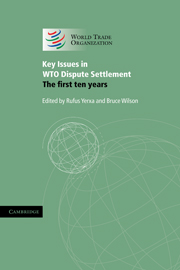Book contents
- Frontmatter
- Contents
- Notes on contributors
- Preface
- Table of cases
- Abbreviations
- PART I Introduction and General Considerations
- PART II The WTO Dispute Settlement System: Its Processes and Its Institutions
- PART III The WTO Dispute Settlement System: Systemic and Other Issues
- 12 The role of lawyers in the WTO dispute settlement system
- 13 Jurisdiction in WTO dispute settlement
- 14 Due process in WTO disputes
- 15 Standards of review in WTO panel proceedings
- 16 Administration of evidence in WTO dispute settlement proceedings
- 17 Confidentiality issues under the DSU: fact-finding process versus confidentiality
- 18 Panels' consultations with scientific experts
- 19 Amicus curiae participation in WTO dispute settlement: reflections on the past decade
- 20 Suspension of concessions and retaliation under the Agreement on Safeguards: the recent US – Steel Safeguards case
- 21 Compliance with WTO dispute settlement decisions: is there a crisis?
- 22 DSU review: a view from the inside
- PART IV Annexes
18 - Panels' consultations with scientific experts
from PART III - The WTO Dispute Settlement System: Systemic and Other Issues
Published online by Cambridge University Press: 04 August 2010
- Frontmatter
- Contents
- Notes on contributors
- Preface
- Table of cases
- Abbreviations
- PART I Introduction and General Considerations
- PART II The WTO Dispute Settlement System: Its Processes and Its Institutions
- PART III The WTO Dispute Settlement System: Systemic and Other Issues
- 12 The role of lawyers in the WTO dispute settlement system
- 13 Jurisdiction in WTO dispute settlement
- 14 Due process in WTO disputes
- 15 Standards of review in WTO panel proceedings
- 16 Administration of evidence in WTO dispute settlement proceedings
- 17 Confidentiality issues under the DSU: fact-finding process versus confidentiality
- 18 Panels' consultations with scientific experts
- 19 Amicus curiae participation in WTO dispute settlement: reflections on the past decade
- 20 Suspension of concessions and retaliation under the Agreement on Safeguards: the recent US – Steel Safeguards case
- 21 Compliance with WTO dispute settlement decisions: is there a crisis?
- 22 DSU review: a view from the inside
- PART IV Annexes
Summary
Introduction
Commercial disputes brought under the auspices of the WTO are becoming more and more complex. As a consequence of the increasingly judicial nature of the WTO dispute settlement system, parties submit increasingly sophisticated legal, but also – and this is a relatively new trend – factual arguments. By their very nature, instruments such as the Agreement on Sanitary and Phytosanitary Measures (SPS Agreement) or the Agreement on Technical Barriers to Trade (TBT Agreement) mean that WTO panels have to adjudicate disputes entailing scientific issues. But disputes brought under the GATT 1994 have also raised contested scientific issues relating to human health and to the conservation of natural resources. More over, in the new ‘legalized’ WTO dispute settlement system, as opposed to the more ‘diplomatic’ procedures used under the GATT 1947, parties tend to increasingly dispute factual evidence.
Pursuant to Article 11 of the Dispute Settlement Understanding (DSU), panels are called upon to ‘make an objective assessment of the matter before it, including an objective assessment of the facts of the case’. As we shall see, WTO panels enjoy a broad margin of discretion in the collection and appreciation of the evidence. This entails a corresponding responsibility to analyse this evidence in a critical and credible manner. More over, the Appellate Body does not review the facts of the case since appeals are limited to issues of law.
- Type
- Chapter
- Information
- Key Issues in WTO Dispute SettlementThe First Ten Years, pp. 204 - 220Publisher: Cambridge University PressPrint publication year: 2005
- 1
- Cited by



